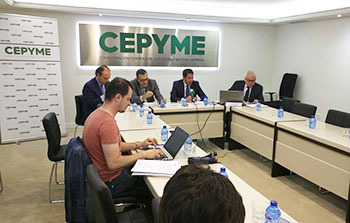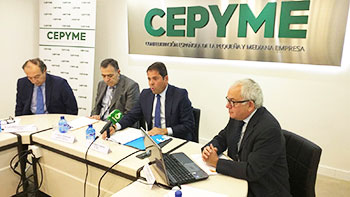IX Financial Assessment of Spanish Companies (EADA and CEPYME)
The IX Financial Assessment of Spanish Companies carried out by EADA and CEPYME confirms the economic and financial recovery of the last three years as well as the growing optimism among Spanish business owners. The report, which was based on an analysis of 445 companies from different sectors and sizes, highlights strong growth in sales by Spanish companies as well as the upward trend in financial return.
Companies’ turnover increased by 5.9% in 2017 compared to the previous year thereby registering its fourth consecutive annual increase and the biggest upturn of the historical series since the first of these reports was published. It is also worth noting the percentage of companies that increased sales compared to the previous year. In 2017, sales increased on average by 5.9% which represents a significant increase when compared to the 3.7% increase in 2016. This is the fourth consecutive year that revenue has increased which implies a recovery of activity levels similar to those seen before the financial crisis.
Higher return and better efficiency
These positive results revealed by EADA and CEPYME in the IX Financial Assessment of Spanish Companies show a significant improvement in financial return. It reached 8.3% in 2017 which is the best return since 2010. The report also indicates that business owners and managers are still planning long term. The positive economic data and the optimistic growth perspectives for the next few years have allowed them to take more strategic decisions based on value generation in both the medium and long-term.
These decisions are based on the following priorities: product development, services or lines of business, greater online presence, improvement of information systems and greater internationalisation.
Despite these favourable results, Vice President of CEPYME Gerard Cuerva has warned of a decrease in the percentage of small businesses that have posted better results than the previous financial year which “has affected the overall profits posted by SME’s.” He also warns that “any sign of political uncertainty will jeopardise the economic situation that companies and employees have worked so hard to improve.”
Relationship with the banking sector
 The IX Financial Assessment of Spanish Companies carried out by EADA and CEPYME also reveals that business owners still prefer the option of self-financing their future investments (40.5%) rather than applying for a bank loan (34%). According to the report, factors such as the process of debt reduction to minimize financial risk, the demand for guarantees when applying for credit or the high cost of the commissions linked to this type of financing have influenced this preference.
The IX Financial Assessment of Spanish Companies carried out by EADA and CEPYME also reveals that business owners still prefer the option of self-financing their future investments (40.5%) rather than applying for a bank loan (34%). According to the report, factors such as the process of debt reduction to minimize financial risk, the demand for guarantees when applying for credit or the high cost of the commissions linked to this type of financing have influenced this preference.
As has been previously reported, there is still a correlation between companies which recorded losses and those which faced restrictions when accessing credit; the latter being true for 38% of small businesses which suffered credit restrictions from financial entities.
Forecast for 2018
Nearly 8 out of 10 business owners and managers surveyed for this report anticipate improved sales. 10% believe sales will remain the same while 12% predict a drop in turnover. 53% of companies also hope to increase recruitment which is a rise of 16% compared to 2016 and 2017, while 14% anticipate recruitment adjustments. This data confirms the robustness of the Spanish economy and reveals that the adjustments and measures which have been implemented over the last few years are showing results.
With regards to investment plans, 6 out of 10 companies anticipate an increase of three percentage points compared to figures published previously. According to EADA professor and author of the report, Rafael Sambola, “this trend must continue as it is the main engine of growth which will create further employment.”

